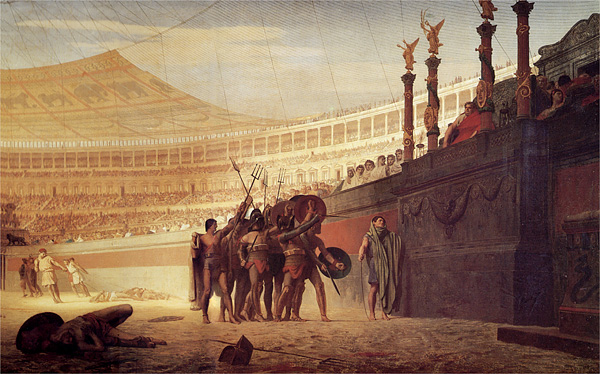

"Ave imperator, morituri te salutant!" "Even when he [Claudius] was on the point of letting out the water from Lake Fucinus he gave a sham sea-fight first. But when the combatants cried out: "Hail, emperor, they who are about to die salute thee," he replied, "Or not," and after that all of them refused to fight, maintaining that they had been pardoned. Upon this he hesitated for some time about destroying them all with fire and sword, but at last leaping from his throne and running along the edge of the lake with his ridiculous tottering gait, he induced them to fight, partly by threats and partly by promises."
Suetonius, Life of Claudius (XXI.6)
Thirty thousand men are said to have worked for eleven years on draining Lake Fucinus by way of an outlet three miles in length. Tacitus (Annals, XII.56) relates that nineteen-thousand prisoners manned the warships that participated in the naumachia celebrating its completion in AD 52 and, "Though the fighters were criminals they fought like brave men." (A more reasonable number would be the crews of the twenty-four triremes that Suetonius says were engaged that day.) To prevent any escape, the ships were surrounded by guards on rafts, as well as catapults on shore.
Just as Gérôme understood "thumbs down" to be the meaning of pollice verso in his painting of the same name, so in Ave Caesar (1859), he attributes this salute to gladiators and not to condemned criminals (nor would the slain gladiator have been dragged from the arena by a hook, as can be seen in the background). Some license, too, has been taken with the setting. Vitellius sits in the imperial box, even though the Colosseum was dedicated in AD 80 by Titus, son of Vespasian, who succeeded Vitellius in AD 69.
Ave Caesar, morituri te salutant (1859) by Jean-Léon Gérôme is in the Yale University Art Gallery. The more popular use of the expression is quoted by Dio, who uses the first person (and not the third): "Hail, Emperor! We who are about to die salute thee" (Roman History, LXI.33.4).
References: Amphitheatres & Gladiateurs (1990) by Jean-Claude Golvin and Christian Landes; Suetonius: The Lives of the Caesars (1914) translated by J. C. Rolfe (Loeb Classical Library); Tacitus: The Annals of Imperial Rome (1959) translated by Michael Grant (Penguin Classics).
See also Naumachia.